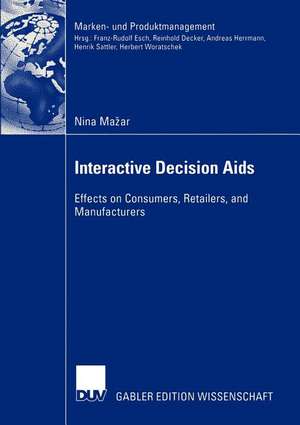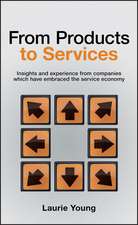Interactive Decision Aids: Effects on Consumers, Retailers, and Manufacturers: Marken- und Produktmanagement
Autor Nina Mazaren Limba Engleză Paperback – 12 dec 2003
Din seria Marken- und Produktmanagement
-
 Preț: 410.95 lei
Preț: 410.95 lei - 15%
 Preț: 468.12 lei
Preț: 468.12 lei -
 Preț: 312.52 lei
Preț: 312.52 lei -
 Preț: 347.41 lei
Preț: 347.41 lei - 15%
 Preț: 442.66 lei
Preț: 442.66 lei - 15%
 Preț: 443.81 lei
Preț: 443.81 lei - 15%
 Preț: 439.38 lei
Preț: 439.38 lei - 15%
 Preț: 440.67 lei
Preț: 440.67 lei -
 Preț: 446.08 lei
Preț: 446.08 lei -
 Preț: 447.84 lei
Preț: 447.84 lei -
 Preț: 449.53 lei
Preț: 449.53 lei -
 Preț: 482.56 lei
Preț: 482.56 lei -
 Preț: 417.30 lei
Preț: 417.30 lei - 15%
 Preț: 440.67 lei
Preț: 440.67 lei - 15%
 Preț: 471.69 lei
Preț: 471.69 lei -
 Preț: 418.07 lei
Preț: 418.07 lei - 15%
 Preț: 471.21 lei
Preț: 471.21 lei -
 Preț: 426.18 lei
Preț: 426.18 lei -
 Preț: 489.69 lei
Preț: 489.69 lei -
 Preț: 488.51 lei
Preț: 488.51 lei -
 Preț: 422.11 lei
Preț: 422.11 lei -
 Preț: 429.22 lei
Preț: 429.22 lei -
 Preț: 490.07 lei
Preț: 490.07 lei -
 Preț: 416.71 lei
Preț: 416.71 lei - 15%
 Preț: 470.72 lei
Preț: 470.72 lei -
 Preț: 451.65 lei
Preț: 451.65 lei - 15%
 Preț: 440.21 lei
Preț: 440.21 lei - 15%
 Preț: 440.21 lei
Preț: 440.21 lei - 15%
 Preț: 440.67 lei
Preț: 440.67 lei - 15%
 Preț: 442.17 lei
Preț: 442.17 lei - 15%
 Preț: 443.81 lei
Preț: 443.81 lei -
 Preț: 448.21 lei
Preț: 448.21 lei - 15%
 Preț: 449.51 lei
Preț: 449.51 lei -
 Preț: 486.21 lei
Preț: 486.21 lei -
 Preț: 425.32 lei
Preț: 425.32 lei -
 Preț: 390.13 lei
Preț: 390.13 lei - 15%
 Preț: 477.74 lei
Preț: 477.74 lei - 15%
 Preț: 446.08 lei
Preț: 446.08 lei - 15%
 Preț: 523.91 lei
Preț: 523.91 lei -
 Preț: 449.74 lei
Preț: 449.74 lei - 15%
 Preț: 527.97 lei
Preț: 527.97 lei - 15%
 Preț: 444.94 lei
Preț: 444.94 lei - 15%
 Preț: 437.89 lei
Preț: 437.89 lei
Preț: 378.92 lei
Nou
Puncte Express: 568
Preț estimativ în valută:
72.51€ • 77.53$ • 60.45£
72.51€ • 77.53$ • 60.45£
Carte tipărită la comandă
Livrare economică 17 aprilie-01 mai
Preluare comenzi: 021 569.72.76
Specificații
ISBN-13: 9783824480203
ISBN-10: 3824480204
Pagini: 160
Ilustrații: XVIII, 138 p. 16 illus.
Dimensiuni: 148 x 210 x 8 mm
Greutate: 0.2 kg
Ediția:Softcover reprint of the original 1st ed. 2003
Editura: Deutscher Universitätsverlag
Colecția Deutscher Universitätsverlag
Seria Marken- und Produktmanagement
Locul publicării:Wiesbaden, Germany
ISBN-10: 3824480204
Pagini: 160
Ilustrații: XVIII, 138 p. 16 illus.
Dimensiuni: 148 x 210 x 8 mm
Greutate: 0.2 kg
Ediția:Softcover reprint of the original 1st ed. 2003
Editura: Deutscher Universitätsverlag
Colecția Deutscher Universitätsverlag
Seria Marken- und Produktmanagement
Locul publicării:Wiesbaden, Germany
Public țintă
ResearchCuprins
1 Introduction.- 2 Conceptual Framework.- 2.1 The Adaptive Decision Maker.- 2.2 Interactive Decision Aids.- 2.3 Overview of Existing Research.- 3 Hypotheses.- 3.1 Attribute Importance Weights.- 3.2 Consumer Welfare.- 3.3 Objective Differences in Product Choice.- 3.4 Perceived Purchase Risk and Applied Processing Method.- 4 Experiment.- 4.1 Method.- 4.2 Results.- 5 Integrated Discussion of Results.- 5.1 Summary of Results.- 5.2 Managerial Implications.- 6 Conclusions and Future Research.- Appendix 107.- References 113.
Notă biografică
Dr. Nina Mazar promovierte bei Prof. Dr. Andreas Herrmann am Lehrstuhl für allgemeine Betriebswirtschaftslehre und Marketing I der Universität Mainz. Sie ist Post-Doktorandin und Lehrbeauftragte für Marketing, insbesondere Marketing Management, Consumer Behavior, Decision Making, Behavioral Economics und eCommerce an der MIT Sloan School of Management sowie Teil der eRationality Group im MIT Medialab in Cambridge, USA.
Textul de pe ultima copertă
It is accepted that interactive decision aids, also referred to as agents, are the central component of e-commerce. However, little is known about their advantages and pitfalls for consumers, retailers, and manufacturers in the context of different types of product or attribute categories. How can we then apply these tools effectively?
Nina Mazar examines the effects of an interactive tool that can tailor information extremely fast: the interactive comparison matrix (CM). It provides product related information in a 'product by attribute' matrix and allows products to be sorted by any attribute. The author shows that the interactive CM has the potential to represent a useful and practicable solution matching the needs of both consumers and online retailers. On the one hand, it increases consumers' welfare, and hence might be a solution to escape the threat of increased price fixation of consumers shopping online. On the other hand, it offers retailers the possibility to systematically influence consumers' preference construction and choice. In addition, since retailers' incentives affect the derived demand for manufacturers' brands, these two results show that manufacturers can face a very different situation in an artificial marketplace.
Nina Mazar examines the effects of an interactive tool that can tailor information extremely fast: the interactive comparison matrix (CM). It provides product related information in a 'product by attribute' matrix and allows products to be sorted by any attribute. The author shows that the interactive CM has the potential to represent a useful and practicable solution matching the needs of both consumers and online retailers. On the one hand, it increases consumers' welfare, and hence might be a solution to escape the threat of increased price fixation of consumers shopping online. On the other hand, it offers retailers the possibility to systematically influence consumers' preference construction and choice. In addition, since retailers' incentives affect the derived demand for manufacturers' brands, these two results show that manufacturers can face a very different situation in an artificial marketplace.











